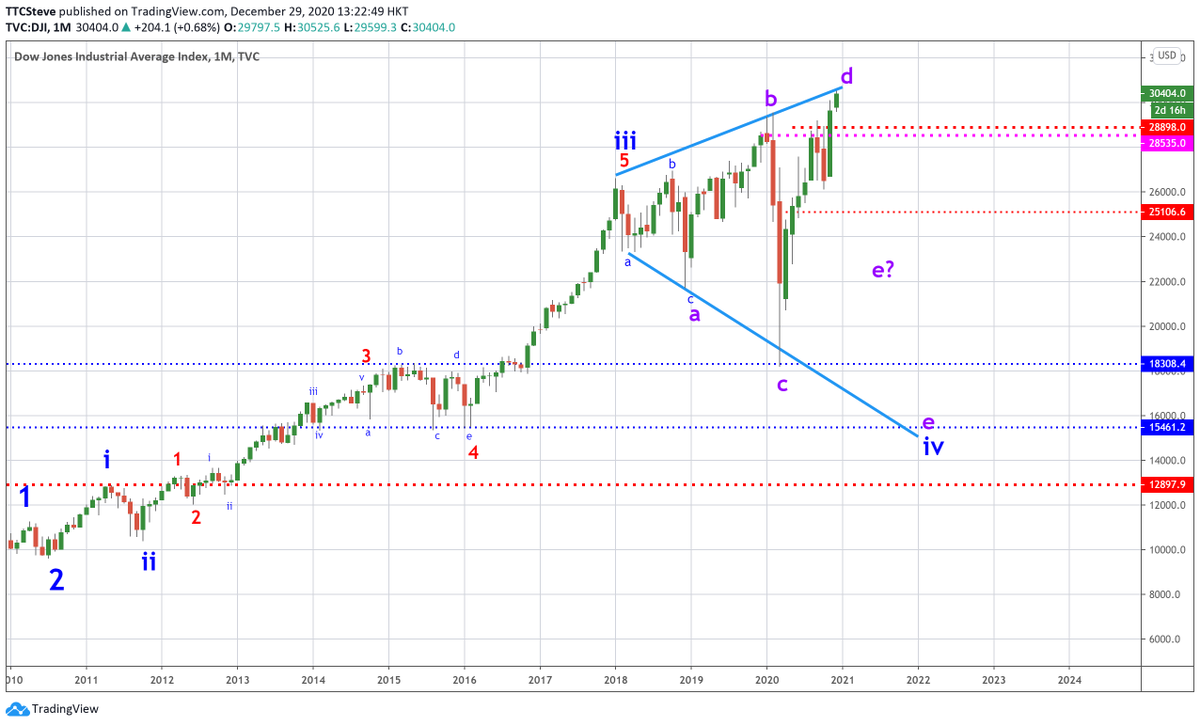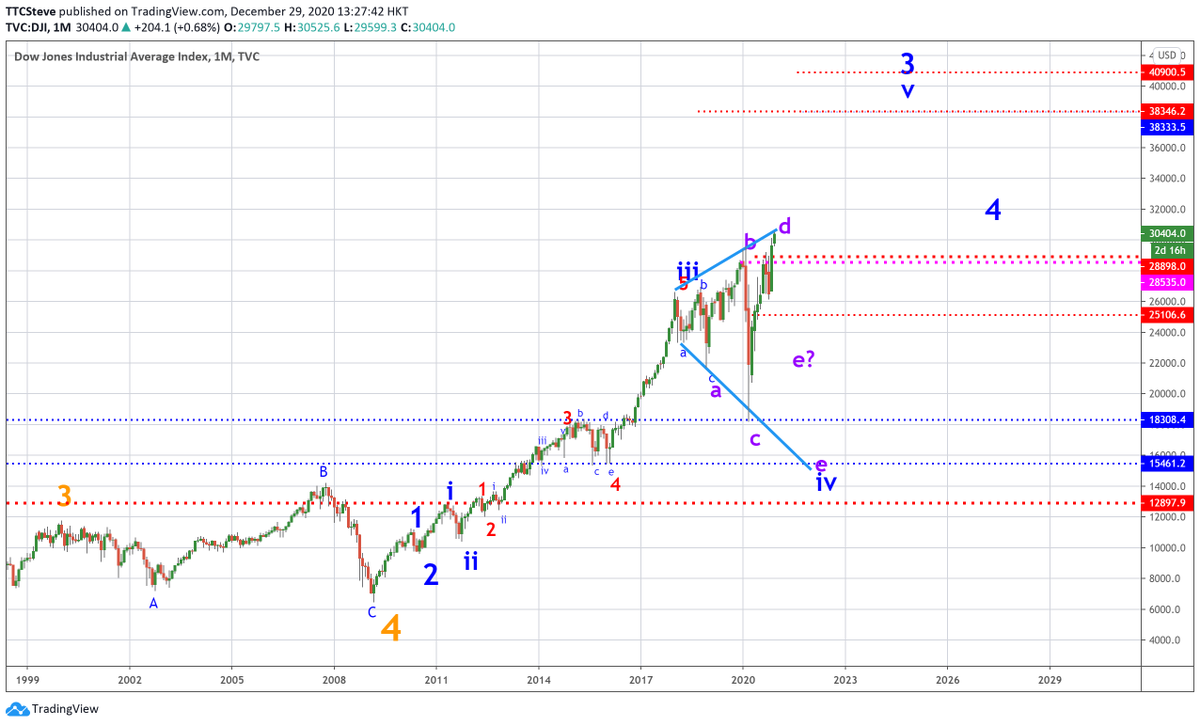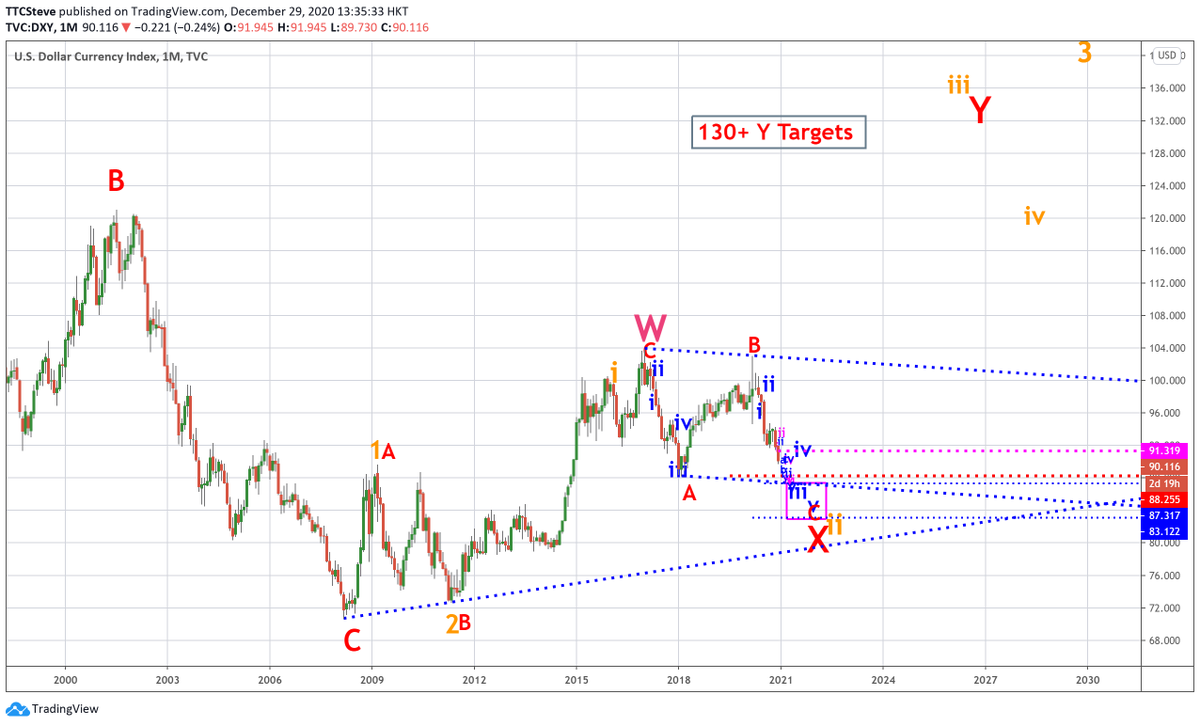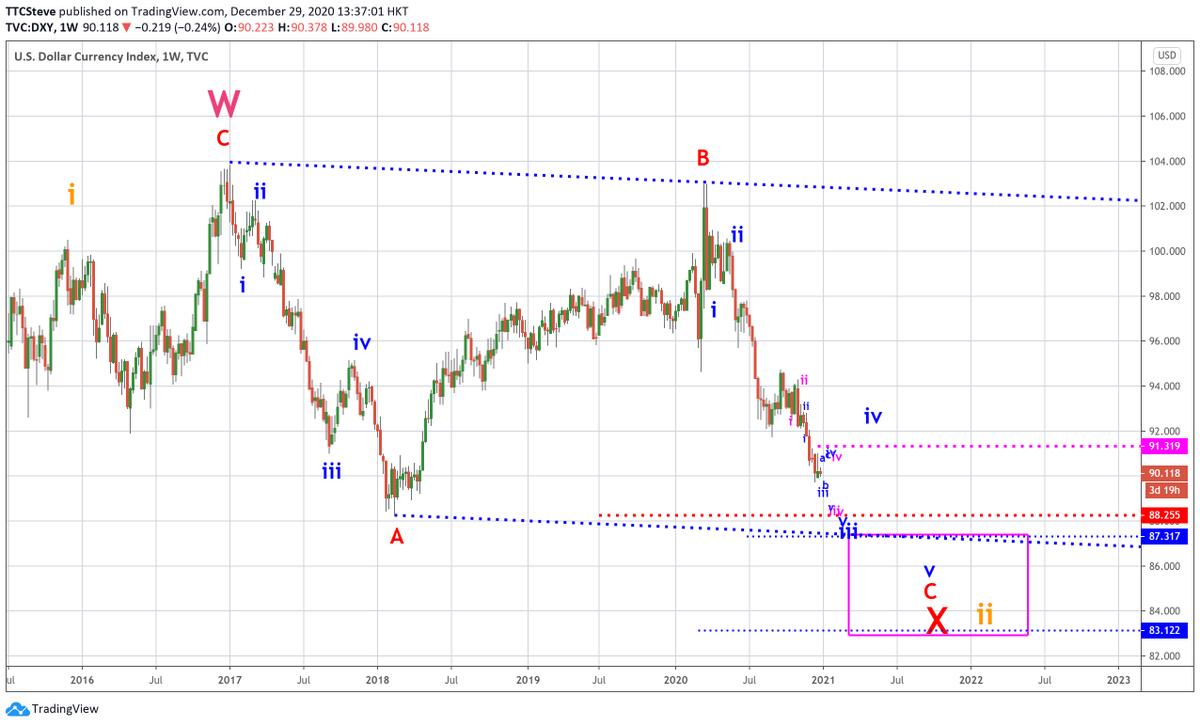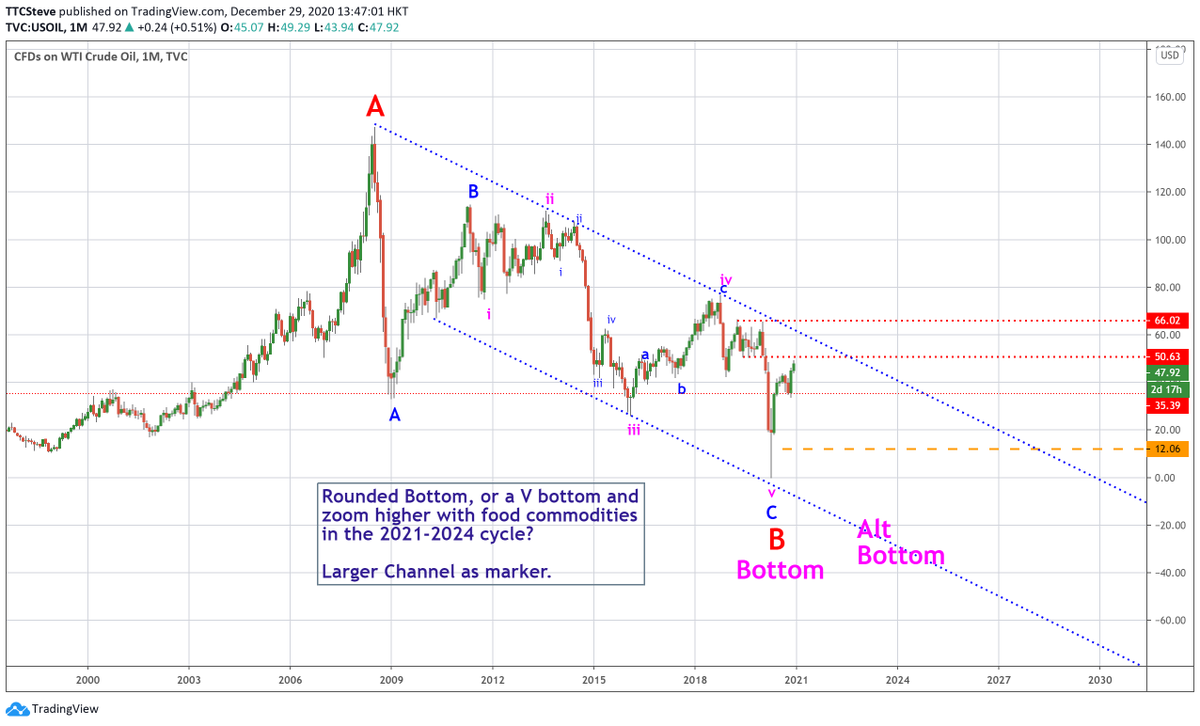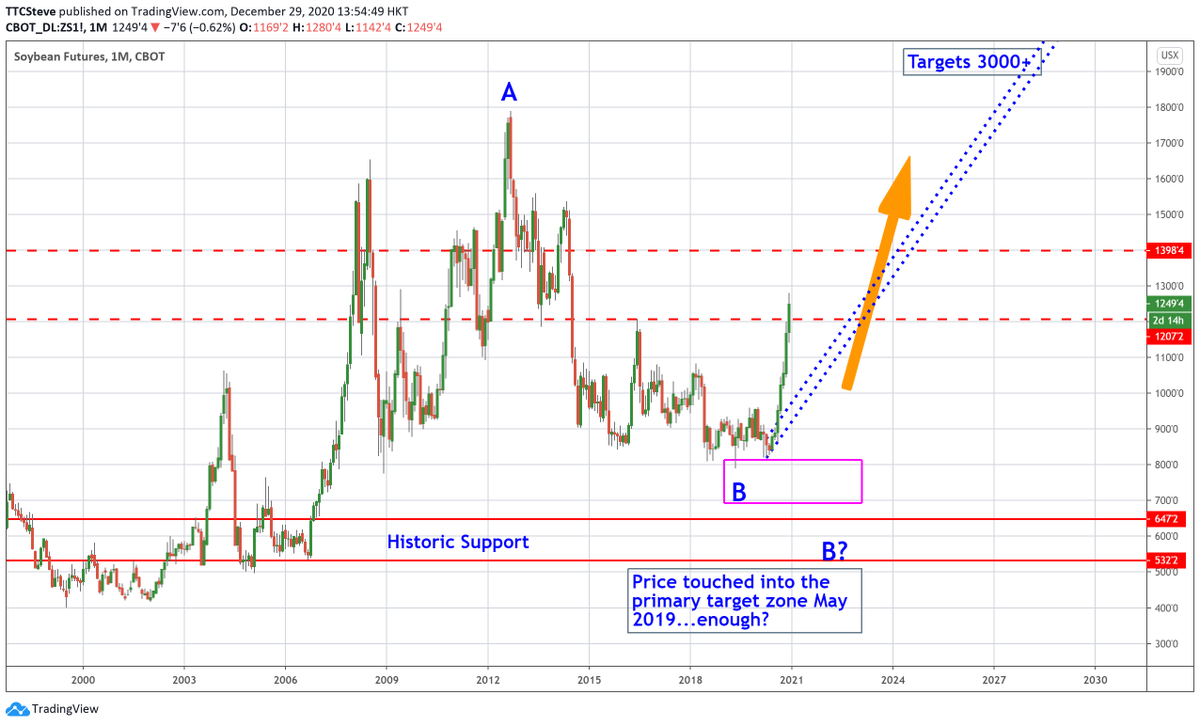2021 Outlook: The Year of Testing Resiliency
After a recap of the previous 3years of Outlooks, I'll delve into the structural setups that 2021+ looks to deliver us in the macro markets and touch on the economy.
After a recap of the previous 3years of Outlooks, I'll delve into the structural setups that 2021+ looks to deliver us in the macro markets and touch on the economy.
The 2018 Outlook perhaps said it best; "Food supply, disease and seismic/volcanic frequency increasing into 2022-2025"...2020 can end up being just a foretaste unfortunately.
'18 also got the Dollar jump and Crude down moves into 2020 spot on.
'18 also got the Dollar jump and Crude down moves into 2020 spot on.
2019 nailed the Hinge Year, though it required moving with the swings internally. The Dollar for example has been hinging for 4 years and can possibly extend that out for 5 with an early 2022 bottom in the cards that I'll go into more below.
2020 got it right in the Hinge Extended caption, and whilst the swing down and March bottom were well captured, I did not expect an Expanding Triangle to be the primary pattern with the run to new highs versus a 2/3rds run expectation.
But 2020 delivered on Oil & the Dollar slide (+other currency pairs) near perfectly. The Geopolitical world has also been playing out as per the outlooks with the ME peace taking many by surprise.
That we have taken a more authoritarian route already seems early in the cycle...
That we have taken a more authoritarian route already seems early in the cycle...
...the old adage, of never letting a crisis go to waste remains true as ever for the political class and as they fight to retain power, the ruled as usual pay the price.
So let's look at what 2021 has in store for us based on structural probabilities in our main macro markets.
Starting with the Dow for good measure of the international flows.
Starting with the Dow for good measure of the international flows.
As long as we see price hold the 32k level on year end and end of month January, the primary pattern should contain the breakout potential and push price down hard into 2021 with the preferred e of iv quite a ways down. A breakout will be worth pursuing in the Alt towards 40k.
People seem beholden to the idea of low and negative rates actually benefitting markets. If that were the case, Europe would not have been languishing. In any case, once the central banks lose their grip, and they will, watch how fast that little measure of risk can rise.
As the natural flow goes when talking about rates, the Dollar inevitably garners attention. Though it rarely follows the conventional wisdom view of rates up dollar up...but then again, what does? That said, I think the 2022-2025 period we will see just that.
$DXY $Dollar
2021 should be quite a rocky year for completing the larger corrective pattern from 2017. Which ultimately leads to one of the better asymmetric setups a trader desires, should this continue to play out.
2021 should be quite a rocky year for completing the larger corrective pattern from 2017. Which ultimately leads to one of the better asymmetric setups a trader desires, should this continue to play out.
Economically, to suggest that the Velocity of Money constraints have washed through these Covid lockdown sovereigns already is beyond optimistic in my view. It will be important to understand that markets and economies are very different animals that respond to different cycles.
$CL $WTI $OIL
Oil was one of the outperformers and one where many thought my sub $12 targets were beyond a joke for quite a few years. Needless to say, that trade is done and I'll be more subdued this year on this market until clear setups arise from here.
Oil was one of the outperformers and one where many thought my sub $12 targets were beyond a joke for quite a few years. Needless to say, that trade is done and I'll be more subdued this year on this market until clear setups arise from here.
As we see how strong this winter in the north pans out in step with the cooling cycle, or otherwise, the supply constraints for commodities remain. With cooling comes disease, not to mention how covid affected the supply chains. The point is that puts upward pressure on commods.
$SZ #soybeans
Soybeans have played very strongly off the buy zone and find themselves nearing an interesting end of year no mans land (1300-1400).
Soybeans have played very strongly off the buy zone and find themselves nearing an interesting end of year no mans land (1300-1400).
To reiterate on the economic side of things, it generally behooves one to not become too entrenched in the status quo, as cycles inevitably show up despite the desires of the lineal thinkers. Perhaps the key one that we've touched on already is the rate at which debt will price.
Of course this will directly affect the Emerging Market debt, namely the dollar denominated amounts. But we are also talking about Sovereigns that have pushed their balance sheet to extremes in terms of serviceability. Not to mention the inability to retain viable debt markets...
i.e. Europe and Japan. With the repo market broken, the band-aids aren't going to hold up for long. And this is where you have the calls for MMT, UBI and other desperate measures these bright sparks can conjure up. Thomas Piketty truly is that Mickey Rourke character in Iron Man.
The desire to move to electronic or crypto currencies, will solve nothing as the ledgers will still have to be squared. This only adds more rocket fuel to the Dollar once the great unwind hits the after burners. Hundreds of trillions in debt being repriced and Dollars required...
the demand will be staggering, not to mention the downward repricing of credit. Magical puffs of smoke all over the globe.
The issue always becomes one of timing, and these things take longer than one generally thinks as there are many hands willing to support the status quo...
The issue always becomes one of timing, and these things take longer than one generally thinks as there are many hands willing to support the status quo...
when she goes though, don't be in line wantingly viewing that long-promised pension to be worth anywhere near expectations and for some it will be a wash.
One of the great challenges ahead is whether the cohesive society we've enjoyed can remain moving forward. The postmodern attack on family, combined with the covid response extinguishing many a small biz and the middle class really does pose some obstacles.
It does make one wonder if we'll ever again see true freedom and equality under the law or whether those freedom's are becoming a relic of the past and relinquished as this decade heats up.
One area that has been forging ahead in returning to those freedom's is the Middle East. It's a fascinating journey to watch the conservative nature of these places return after being stifled under radical rule for so long.
To think that the West is more attuned to authoritarian rule than the Middle East and other area's is quite the shock for a Gen X like myself. But that's where we find ourselves as the 2020's play out their natural cycles.
On behalf of my family, I do wish you all a year of growth and wise actions for what could be another fascinating one in 2021. Trade Well!
Whilst I've missed much in this short economic rant, I must at least reference the cult of 'Stakeholder Capitalism' that's cutting a swathe through free market players along with other sustainability nomenclature such as ESG.
These are NOT productive measures based on merit. They are core tenets of socialism's desire to control the means of production, and we know full well how that eventuates.
The Great Reset, Resetting Capitalism, Build Back Better, We Are All in This Together, all exhibit this challenge a few are wanting to impose on populations. That 'they' deem populism a disease, is a clear signal of intent.
In any case, this isn't the forum for a clear setting out of these issues, but it's important to at least raise them when we are talking about 2020 into 2021 and beyond.
These great ideological challenges often come to the fore in times of large cyclical inflection...which the 2020's & into the 2030's are.
The Relative Game Ahead:
With Global Capital Formation approximating $400+ Trillion (Real Estate, Equities, Bonds) of which over $100T is illiquid. The game ahead will be a different monster than the last 20 years.
With Global Capital Formation approximating $400+ Trillion (Real Estate, Equities, Bonds) of which over $100T is illiquid. The game ahead will be a different monster than the last 20 years.
An important concept is dealing with aggressive governments once they lose their revenue streams. There are multiple examples in history, but the key point is to be able to implement a nimble plan to follow the smart capital.
By the way, not all 'smart' capital is smart. In any case, once the revenue streams dissipate for authorities the game of tag begins. Private capital starts to flee whilst governments look to lock it down and replace lost streams with additional levels of taxation & regulations..
Of course the illiquid and semi illiquid become the primary targets simply because of their lack of portability as easy targets. Though it's a game not limited to the low hanging fruit.
All assets will face an uphill battle, but the primary goal of capital will be in understanding the 'relative' aspect of the game. The legal layers that surround private companies and corporations to protect ownership and existence will become very valuable moving forward.
But before exploring that further, let's look at the more vulnerable and why.
Real Estate will always experience certain pockets of outperformance, though as a general asset class the lack of portability will put this class well within the crosshairs of the hungry.
Real Estate will always experience certain pockets of outperformance, though as a general asset class the lack of portability will put this class well within the crosshairs of the hungry.
Additionally, 2020 has also shown how lockdowns can savage economies...though the fallout is only marginally showing to date. Global GDP looks to have already dropped near 30% from $90T, and that's before these secondary lockdowns are coming into play into the New Year.
Whilst employment has both changed and reduced, the effects on property are manifold. Do you really want to be a commercial owner at present with the online work from home trend in full swing? Not to mention the rapidly reduced foot traffic for the CBD retail sector etc etc
In very basic terms without bothering with specific DCF's and valuations, property will have an uphill battle ahead. There are of course those areas that are experiencing a surge to escape urban centre's at present. Even so, that represents a massive destruction of capital.
The next asset class of note is Bonds. I'm going to keep this simple. The Sovereign bond market and the private bond market...a number of these Sovereigns (Europe & Japan) are at a stage that they can no longer sustain their bond markets.
The evidence in history shows that Sovereigns are eventually always the ones that fail and default. Private bonds at the very least will pay out a portion of the original without the ability to change the rules as they please.
Though these aspects haven't even considered the affects of rising rates and their inverse relationship with price. So even without the threat of defaults, significant repricing lower is to be expected once historically low rates are unpegged from their artificial levels.
As you've likely already surmised this next step, rising rates significantly affect leveraged instruments such as property. I'll leave the numbers up to you to decipher, the issue we're more interested in is the larger relative game between property, bonds and equities.
Considering the basic risks such as regulatory, taxation, holding costs, confidence and cyclical changes both societally and economically...there is a clear cut winner in the reduced risk category.
In terms of timing and market cycles internally within any particular asset class, there's some very large inflections that are coming into play on the larger frequencies. So, though you can see where I'm headed even equities will require some timing.
I cover some of this in the structural posts though you will do well to form your own analytical techniques to take advantage of one of those times in history where these intermarket inflections truly decide winners and losers...in the most definitive of relative terms.
One last point on the relative game...currency is an important aspect you will want to get a strong handle on. It can add multiples to the final results as you 'relatively' glide into the '30's...ready and waiting for the next inflection ahead.
Happy New Year!

 Read on Twitter
Read on Twitter